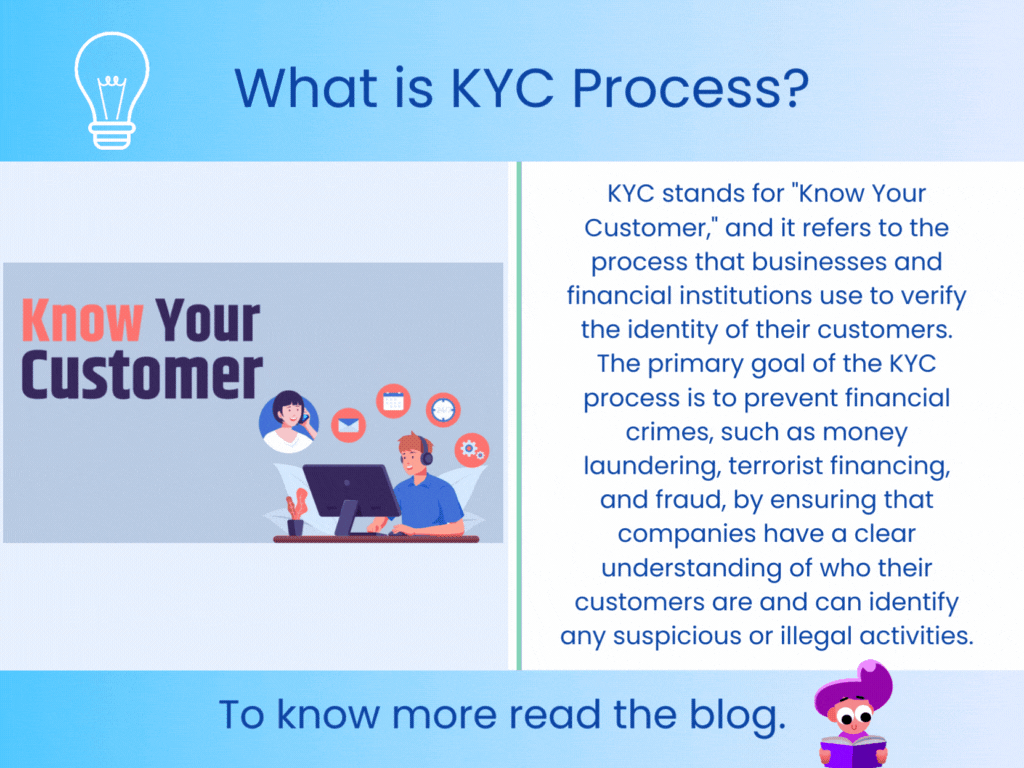What is KYC Process? Why KYC is necessary?
KYC stands for "Know Your Customer," and it refers to the process that businesses and financial institutions use to verify the identity of their customers. The primary goal of the KYC process is to prevent financial crimes, such as money laundering, terrorist financing, and fraud, by ensuring that companies have a clear understanding of who their customers are and can identify any suspicious or illegal activities.
The KYC process typically involves collecting and verifying various types of information about a customer, which may include:
Identity verification: Customers are required to provide official documents to prove their identity, such as a passport, driver's license, or government-issued ID.
Address verification: Customers must provide proof of their residential address, such as a utility bill or bank statement.
Source of funds: Companies may inquire about the source of the customer's funds to ensure they are legitimate and not derived from illegal activities.
Risk assessment: Businesses may evaluate the potential risks associated with serving a particular customer based on factors such as their occupation, country of residence, and transaction history.
Politically Exposed Persons (PEP) screening: Companies may screen customers against PEP lists to identify individuals who hold prominent public positions and may be at a higher risk for corruption or bribery.
Enhanced due diligence (EDD): In some cases, when dealing with higher-risk customers, additional layers of scrutiny may be applied through EDD measures.
The KYC process is a legal and regulatory requirement in many countries and industries, especially in the financial sector. It is mandated by anti-money laundering (AML) and counter-terrorism financing (CTF) laws and regulations. Companies are responsible for keeping accurate records of the information collected during the KYC process and are required to report suspicious activities to the relevant authorities when necessary.
By implementing a robust KYC process, companies can foster transparency, reduce the risk of involvement in illicit activities, and maintain compliance with applicable laws and regulations. It also helps in building trust between companies and their customers by ensuring a safe and secure business environment.
The KYC (Know Your Customer) process is necessary for several important reasons:
Prevention of Financial Crimes: KYC helps prevent financial institutions and businesses from being unwittingly used for illegal activities such as money laundering, terrorist financing, fraud, and other financial crimes. By verifying the identity and background of customers, institutions can reduce the risk of facilitating illegal transactions.
Compliance with Regulations: Financial institutions are subject to strict regulatory requirements imposed by governments and financial authorities to combat financial crimes. KYC is an essential part of these regulations and is mandated by law in many jurisdictions.
Risk Mitigation: Conducting due diligence on customers enables businesses to assess the level of risk associated with serving them. High-risk customers may require enhanced monitoring and scrutiny to ensure that their activities are legitimate.
Protection of Reputation: Implementing robust KYC measures helps protect the reputation of financial institutions and businesses by demonstrating their commitment to preventing illicit activities. Failure to comply with KYC regulations can lead to severe penalties and damage to their reputation.
Safeguarding Customers: KYC not only protects the institutions but also safeguards customers by ensuring that their accounts are not misused by criminals. By detecting and preventing fraudulent activities, customers' assets and personal information remain secure.
International Standards: Many countries and international organizations have established KYC requirements as part of a global effort to combat financial crime. Following these standards is crucial for maintaining cross-border financial relationships.
AML and CFT Compliance: Anti-Money Laundering (AML) and Countering the Financing of Terrorism (CFT) regulations are key components of KYC. By adhering to these regulations, businesses contribute to the global fight against illegal funding and terrorist activities.
Enhanced Financial System Stability: An effective KYC process strengthens the overall stability and integrity of the financial system. By reducing the potential for illicit financial flows, it helps maintain confidence in financial institutions and the economy as a whole.
Overall, KYC is a fundamental practice that serves as a vital tool in safeguarding the financial system, protecting customers, and upholding the integrity of financial institutions and businesses. It plays a crucial role in promoting transparency, accountability, and trust within the financial sector.


